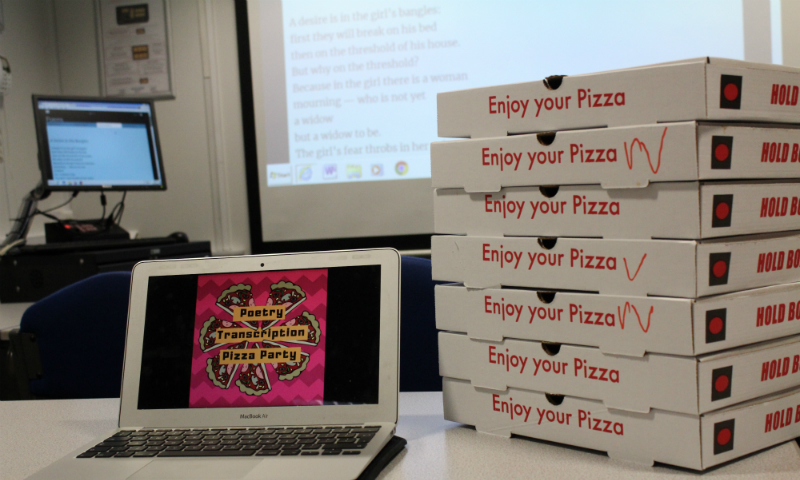
Last month the Poetry Translation Centre partnered with The Birkbeck College Applied Linguistics Society (BCALS) to run its first Poetry Transcription Pizza Party. While much of London was gathered in overheating pubs to watch the England versus Belgium match, a small group of language enthusiasts gathered in the air conditioned chill of a basement room under Birkbeck’s Bloomsbury campus to transcribe poems and munch on pizza.
Why was a room full of modern people going to spend their time transcribing poetry like a bunch of medieval monks? Good question. In the early days of the PTC there were limited choices for displaying poems in multiple languages online. Many writing systems, like Arabic script or the Hebrew alphabet, were not recognised by early browsers and so our poems would be reduced to lines of empty rectangles called Tofu. The PTC got around this by using images of the original poems, these Jpegs allowed the poems to be read but it was a poor solution. The original poems look out of place, and because they were not actual text files they were invisible to search engines.

Today, online support for different languages has come along way. Keyboards on smartphones can handily toggle between different languages. Browsers can now understand a range of different languages. So to make the original poem on our website more accessible we decided to transcribe them into computer text that could be found by online search engines, literally making these international poems more accessible.
Drawing inspiration from the Live Art Development Agency’s ‘Editing Ourselves into History’ project, where volunteers edited Wikipedia pages to tackle the free encyclopaedia’s bias towards male artists, we decided to crowdsource the project. We looked to London’s population of multilingual students to lend us their time and enthusiasm to retype the poems. We talked to Louise Rolland from BCALS who instantly saw the project as a practical way to push back against anglophone cultural bias on the internet and open up a conversation about the political issues surrounding translation.
Spearheaded by Louise and her fellow committee members at BCALS the inaugural Poetry Translation Pizza Party was a great success. The room was filled with students from Birkbeck and the School of Oriental and African Studies (SOAS). Tapping away on their touchscreens, using Arabic, Kurdish, Urdu, Hindi and Korean keyboards, they worked away to update the poems on the PTC website, only occasionally eating up the WiFi by sneaking a peek at the match.

A handful of poems transcribed into searchable text files was a small first step. Now the PTC is looking for more ways to tackle the larger cultural and political issues that fill the margins of the translation process. We are already making plans for larger transcription events, with even more pizza, and looking to build partnerships with other student groups. If you are interested in getting involved or working on your own projects exploring the politics of translation please get in touch.


